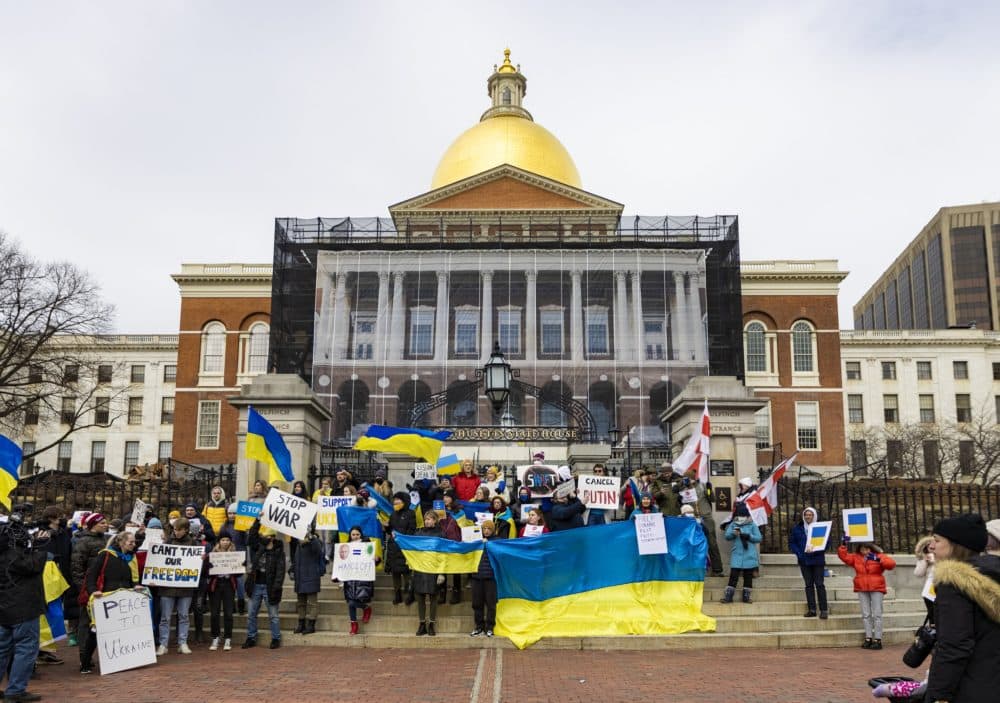Advertisement
Mass. House rejects gas tax relief, Russia divestment proposals in spending bill

A $1.6 billion spending bill passed the Massachusetts House unanimously on Wednesday after representatives shot down Republican bids to divest state pension holdings from companies with business interests in Russia and suspend the state's gas tax until prices fall below $3.70 a gallon.
Passed a day before the two-year anniversary of Gov. Charlie Baker's March 2020 declaration of a state of emergency around COVID-19 and with public health metrics trending in a positive direction, the bill reflects the continued influence of the virus.
It allocates $700 million for pandemic-related expenses, including COVID testing, treatment, vaccination access and personal protective equipment, spending that House Ways and Means Chairman Aaron Michlewitz said would help Massachusetts prepare for the future.
The midyear spending bill also extends COVID-related eviction protections through March 2023 and continues both special pandemic permissions for outdoor dining and the authorization for restaurants to sell beer, wine and cocktails with takeout orders through April 1, 2023.
Before passing the bill, representatives agreed to an amendment that added $6.75 million in spending — $1.75 million for the Department of Fire Services and $5 million in additional support for the Low-Income Home Energy Assistance Program.
The community action agencies that administer the fuel assistance program had asked for $50 million, writing to Michlewitz Tuesday that they have seen an increase in applications and that many of the people they've been able to help have exhausted their benefits as heating oil prices rise.
Spencer Republican Rep. Peter Durant also cited Russia's invasion of Ukraine and spiking energy prices in his push to suspend the gas tax, a proposal that Revenue Committee Chair Rep. Mark Cusack dismissed before the vote as a "gimmick."
Durant's amendment sought to suspend the gas tax until the average per-gallon price of unleaded gasoline in Massachusetts is less than $3.70. AAA reported an average price of $4.24 per gallon in the state on Tuesday.
The House rejected Durant's amendment on a voice vote, where individual lawmakers' positions are not recorded.
Paul Craney of the Massachusetts Fiscal Alliance criticized the voice vote, saying it was "disappointing that House lawmakers play games to protect themselves from hard votes while motorists are still left paying the highest recorded prices for a gallon of gasoline."
Advertisement
Lawmakers also rejected an amendment that sought to make Massachusetts one of a number of states that have used their retirement funds to make a political statement against Russia's invasion of Ukraine.
The amendment offered by House Minority Leader Brad Jones would have given Treasurer Deb Goldberg the authority she needs to sell off the small fraction of the state's $104 billion pension fund invested in assets tied to Russia.
The proposal, however, was cast aside without debate after House Democrats excluded it from a bulk amendment put together by House leadership, and Jones declined his opportunity to force it to be considered individually.
Jones's amendment would have also prevented companies owned by, controlled by, or based in Russia from accessing any cash or securities in banks subject to Massachusetts oversight. Similar bills have been filed in the Senate by Minority Leader Bruce Tarr and Sen. Walter Timilty, a Democrat. Those bills have been referred by the Senate to the Joint Committee on Rules.
The Pension Reserve Investment Management board has said that none of its investments have been impacted by U.S. sanctions on Russia, but the fund does have a small "exposure" to Russia of $140 million, or less than 0.2% of the fund.
Those Russian holdings are currently tied up in public equity and debt, according to Treasury officials, and could not be sold off until the Russian stock market, which has been closed since Feb. 28, reopens for trading. At that point, some expect PRIM's investments will be significantly devalued, if not worthless, due to the financial backlash against Russia.
With a smaller bottom line than the $2.4 billion version Gov. Charlie Baker filed, the House's bill also features $100 million to repair local roads from winter damage, $100 million in rental assistance, $55 million for rate increases for human service providers, $140 million to support staffing and program needs at private special education schools, and $10 million to support resettlement of refugees, particularly those from Ukraine.
Sam Doran contributed reporting.